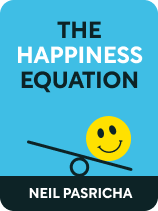

This article is an excerpt from the Shortform book guide to "The Happiness Equation" by Neil Pasricha. Shortform has the world's best summaries and analyses of books you should be reading.
Like this article? Sign up for a free trial here .
What does it mean to “accept yourself”? Why is it important to accept yourself unconditionally, including the parts of yourself you’d wish to change?
Self-acceptance means embracing all parts of yourself unconditionally, even the things you wish you could change. It’s important to accept all aspects of yourself, no matter how much you don’t like them—selective self-acceptance only exaggerates the focus on your flaws and makes it harder to accept yourself as you are.
Here’s why it’s so important to cultivate unconditional self-acceptance and some ideas on how to go about doing that.
Accept Who You Are and Figure Out What Makes You Happy
Instead of chasing validation, focus on feeling happiness. Free yourself from the need for validation by accepting who you are and what you need to feel happy. Pasricha argues that this shift in thinking encourages a cycle of happiness: Self-acceptance inspires you to align your behaviors and decisions with what makes you happy. This alignment encourages positive self-judgment and influences you to make decisions that further increase your happiness.
Furthermore, the more you encourage positive self-judgment and engage in things that make you happy, the less time you waste thinking about how others perceive you. This helps you accept yourself exactly as you are and frees you from the pressure of adapting to please or impress others.
According to Pasricha, this increases your happiness in two ways: First, placing less weight on what others think of you decreases insecurity and self-consciousness and increases self-confidence. Second, because you’re not projecting a false image of yourself or hiding behind achievements, you feel comfortable knowing that people appreciate you for who you are, not who you’re pretending to be. This naturally improves your self-judgment, allows you to relax and enjoy being yourself, and encourages you to make decisions that continue to fuel your happiness.
| How Self-Acceptance Improves Self-Judgment and Happiness Unconditional self-acceptance improves your self-judgment and boosts happiness in two ways: First, when you accept yourself as you are, you’re less inclined to seek acceptance or validation from others by masking unwanted aspects of yourself. Second, it allows you to separate individual achievements and mistakes from your overall self-opinion—meaning that your self-judgment (and resulting happiness) doesn’t fluctuate according to individual experiences. Unconditional self-acceptance is important because partial self-acceptance magnifies the importance of unwanted flaws, increases self-consciousness and self-judgment based on individual experiences, and makes it difficult to feel happy with yourself as you are. For example, you might wish that you felt more confident interacting with others. Not accepting this part of yourself makes you feel more self-conscious about how confident you appear—you judge yourself according to how well you perform in individual interactions. After confident interactions, you feel good about yourself and you feel happy. After unconfident interactions, you feel bad about yourself, uncomfortable about this part of yourself, and unhappy. This leads you to conclude that your unconfidence is the cause of your unhappiness and it impels you to reject this aspect of yourself—for example, by projecting a false image of confidence. On the other hand, unconditional self-acceptance keeps your self-judgment consistent regardless of how confident you feel in each interaction. You’ve already accepted yourself, so you don’t look to others to decide how you should feel about yourself. As a result, you don’t feel impelled to mask any aspects of yourself and find it easier to maintain a feeling of happiness regardless of your “faults” or what others might think of you. |
Pursue Enjoyable Activities to Practice Self-Acceptance
Pasricha suggests practicing self-acceptance and figuring out what makes you happy by considering what activities you do purely for enjoyment. From there, increase your happiness by brainstorming additional ways to pursue these activities in different contexts or with different people. For example, if you enjoy writing, start a blog or join a writing group to create more opportunities to experience happiness.
(Shortform note: Gretchen Rubin (The Happiness Project) offers an interesting way to expand upon Pasricha’s method. After pinpointing experiences that you most enjoy, set an ambitious goal that requires you to actively focus on these activities to succeed. Having a clear goal will help you prioritize the way you spend your time and create more opportunities for similar uplifting experiences. For example, Rubin’s love of writing inspired her to set the ambitious goal of completing a 50,000-word novel in one month. Her work on this goal led to a number of opportunities that now allow her to pursue writing as a full-time career.)
| How to Practice Self-Acceptance In The Power of Vulnerability, Brené Brown expands on Pasricha’s ideas about self-acceptance by suggesting three ways to focus more on what makes you happy and less on what others think of you. Let go of other people’s expectations: Be willing to say no to things you don’t want to do without considering what others think of you. For example, say no to social invitations without worrying that your friends will feel hurt or upset by your absence. Choose to focus on self-compassion instead of perfectionism: Make the conscious effort to be kind to yourself more often, particularly when you judge yourself for making mistakes or acting inappropriately. For example, if you routinely obsess over conversations you’ve had with others, stop this self-analysis and instead do something that enhances your sense of well-being, like reading a good book. Detach yourself from self-doubt by focusing on what you care about: Think about what’s important to you and invest more time in it. The more you focus on what’s satisfying to you, the less attention you’ll give to thoughts that undermine your sense of self-worth. |

———End of Preview———
Like what you just read? Read the rest of the world's best book summary and analysis of Neil Pasricha's "The Happiness Equation" at Shortform .
Here's what you'll find in our full The Happiness Equation summary :
- How to overcome the four common obstacles to happiness
- The five methods to reduce the toll of trivial tasks and decisions
- Why you need to stop chasing external validation






